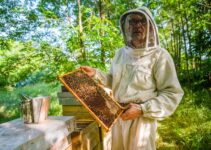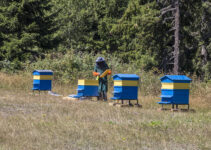There is no doubt that beekeeping has become very popular and important in different rural communities where beekeepers tend to have a wider area and more resources to work with. However, what about those who live in urban areas? Are urban beekeepers just as successful as rural ones? If so, how do urban beekeepers keep their bees thriving?
Urban beekeepers are able to keep their bees thriving by making sure they choose the right location, strategically planting flowers in nearby areas, complying with local restrictions and rules regarding beekeeping, and keeping their neighbors happy. Of course, it will also help if you join a local beekeeping community.
Unlike beekeeping in smaller rural localities, beekeeping in urban areas can be more difficult because of the different challenges that an urban beekeeper needs to overcome. However, as long as you know what to do as a beekeeper living in an urban area, you should be able to do fine when it comes to keeping your bees thriving.
Can you keep bees in urban areas?
Keeping bees is trending, with many more new beekeepers entering the fray each year. Some love the joy of tending to their hives and enjoying the flow of pure and natural honey for their family. Others are attracted to something they can see as a fun side business.
However, most beekeepers tend to come from rural communities or in suburban localities that tend to be further away from urban settlements. After all, in smaller and less-populated areas, there are more green spaces to work with for the bees. On top of that, beekeepers have homes that are spaced further apart from their neighbors, and that ultimately minimizes the chances of the bees scaring or bothering neighboring houses.
So, if beekeeping tends to thrive well in rural and suburban settlements or communities, does that mean that most beekeepers choose less-populated areas because it’s the only way? Are hives even viable in urban areas? Are you even allowed to keep bees if you happen to live in an urban community such as a big city?
The good news is that yes, of course, you can keep bees in urban areas. Generally speaking, bees are allowed in urban settlements and even in big cities. This is the practice we call urban beekeeping, which is simply beekeeping in an urbanized area such as a big city. There are even several big cities that are developing in their acceptance of urban beekeeping as a practice and how open they are in helping this hobby or endeavor grow.
An example of a city that openly welcomes urban beekeeping is Detroit, Michigan. In Detroit alone, there are plenty of different native colonies that can be found in the urban wilds of the city. However, the city itself also has urban farm initiatives that actually aim to acquire vacant lots that they can use for urban beekeeping.
In Chicago, back in 2003, the mayor himself actually placed two hives on top of the Chicago City Hall. Since then, the bee population in Chicago has increased. The city was even able to stop one of its suburbs from implementing a bee ban.
Then, in New York, you would be surprised to know that the practice of beekeeping was actually banned until 2010 but this did not deter New Yorkers from owning and taking care of beehives simply because they had the support of different urban beekeeping groups that pushed against the ban. The ban was lifted in 2010, but there were different regulations that the city put in place to make sure that only non-aggressive bees were allowed and that beehives should be registered.
Of course, as the weather conditions down there seem to be almost perfect for bees, beekeeping has a long history in the city of Los Angeles, where plenty of different urban beekeepers have been keeping bees in the urbanized city since the 1880s. However, in 1879, beekeeping was banned in LA primarily because of how the lawmakers thought that the bees were damaging the citrus crop. It wasn’t until 2015 that the law was finally lifted so that people can freely keep bees in Los Angeles again.
As you can see from those cities, urban beekeeping is actually generally allowed in cities. But you have to understand that this is merely a general rule and is not absolute because it still depends on the city or locality where you live. For example, beekeeping was banned in New York until 2010 while, in LA, people were only allowed to keep beehives within city limits after 2015.
This means that you need to know the rules and regulations of your city or locality first before you attempt to become a beekeeper or else you would end up with someone breathing down your neck! The first thing you need to do is to check with your city ordinances to see whether or not there are laws against beekeeping. After that, check with your local area too, because there will be certain communities that are against beekeeping for various reasons.
So, as long as both your city and your immediate locality don’t have rules and regulations against beekeeping, urban beekeeping is actually allowed. But take note here that, even if some cities and localities do not ban beekeeping, there are still some regulations that are put in place to make sure that beekeeping and the bee population in the urbanized area are kept under control.
What are the challenges to urban beekeeping?
At this point, you are already aware that urban beekeeping is generally allowed depending on where you live. However, because we did say that this article is all about knowing how urban beekeeping thrives, let us first look at the different challenges that tend to make urban beekeeping more difficult than rural beekeeping.
City and local ordinances
As you might have already expected, the first and probably the most difficult challenge for any beekeeper to overcome are the city or local ordinances that may be restricting or even banning them from actually keeping beehives within the city limits.
While beekeeping may be allowed in cities on a general level, you have to know that there are certain urbanized cities and local communities that have bans against beekeeping because of various reasons such as the “danger” that the bees may pose to the populace. That’s why this tends to be the most difficult challenge that urban beekeepers tend to face, as they can’t always keep beehives in their properties unchecked.
Location
So, even if urban beekeeping may be allowed in your city or locality, another problem you have to face is where to keep your bees. This isn’t too big of a challenge in rural communities because they tend to have large open spaces where they can keep their bees. Of course, they also tend to have plenty of green areas where bee colonies can thrive regardless of where the hives are placed.
However, in urbanized areas, the traditional setting of an apiary where hives are scattered around a backyard full of colorful flowers tends to be nearly impossible to pull off because, in the first place, it can be difficult for you to have that kind of setting due to space constraints and because of how your neighbors probably won’t appreciate having bees around just a few feet away from their windows.
Of course, if you live in an apartment in a big city such as New York, you might think that beekeeping is impossible because you don’t even have a backyard. That is why looking for an ideal location is such a challenge for urban beekeepers as there are plenty of different constraints they have to consider.
Flowers
In case you still don’t know, bees love flowers or flowering plants so much because they get their food from these flowers. Of course, honey bees also collect nectar and pollen so that they can further process them into honey by the time they return to their hives. In a sense, flowers and bees go together. Bees won’t be able to survive or thrive without flowers, and some would say that flowers can’t survive without bees either because of how they rely on these insects for pollination.
But the problem in an urbanized setting is that, in place of flower beds and trees, you have large skyscrapers and apartment buildings. There are very few green spaces in urban areas, especially if you live far away from the nearest park. This makes it difficult for bees to actually find food they can eat to survive or even nectar that they can use to produce honey. As such, it is quite easy to understand why urban beekeeping can be difficult at this point.
The neighbors
Sure, Greg and Susan living next door just a few feet away from your doorway might be perfectly nice people who respect you and even invite you over from time to time. But, let’s face it, not everyone is a fan of bees as there is some perceived danger that comes with bees. And yes, we are talking about their stingers.
While bees are merely defensive creatures that will sting when they feel threatened, telling that to your neighbors won’t easily convince them that your bees are safe because there are still chances that they will get stung. Of course, you don’t want little Jimmy to get stung by a swarm when he accidentally hits a hive with a baseball while playing catch with Greg.
So, for safety’s sake, it becomes a big issue among neighbors that there is a household that is keeping beehives. Bees can be nuisances, believe it or not, even though they also have benefits to society. And that is why some cities and localities have rules and regulations against bees.
With all of those things considered, it becomes apparent that urban beekeeping really is a challenge in comparison to rural beekeeping. It might be easier for you to become a beekeeper in suburban areas because of how there is a bit more space and more green areas for your bees, but there are still common challenges between urban beekeeping and suburban beekeeping that tend to make these endeavors difficult. And that is why we are here to talk about how you can thrive as an urban beekeeper.
What are the benefits of urban beekeeping?
In case you were disheartened by the challenges that come with urban beekeeping, we are here to encourage you to pursue the endeavor. That’s because urban beekeeping actually comes with a lot of different benefits not only for you but for the entire urbanized area as well. And these benefits that we are going to talk about are the reasons why some cities and urbanized localities are becoming more open to urban beekeeping.
Bees actually thrive in urban settlements
It might be difficult to believe but the fact is that bees actually thrive in urban settlements and are better grown in cities than in rural environments. While there are challenges to urban beekeeping, bees that can thrive in urban settlements and manage to survive and become healthy in such environments tend to become stronger and more productive than their rural counterparts.
That’s because living in an urbanized area allows the bees to enjoy better biodiversity in terms of their diet and the environment they are used to. So, if bee colonies end up doing well in the city, this can result in stronger genetics on the part of the bees as they will be able to produce stronger and healthier offspring in the future.
Improves the ecosystem
One of the biggest problems that urbanized areas tend to face is the lack of green spaces due to how a huge chunk of the space is reserved for skyscrapers and residential buildings. And even if there are large spaces primarily reserved for greenery such as in parks, the plants in that area won’t be as healthy as the ones you see in rural communities.
However, bees improve the ecosystem in an urbanized area because of the very fact that they are the best pollinators that nature has to offer. They allow plants to propagate primarily because they carry pollen wherever they go. And this is the exact reason why bees are often considered the most important creatures on this planet.
There is a decline in the bee population
Over the past few decades, it has been observed that the bee population is declining due to a wide variety of different reasons such as deforestation and climate change. While there are rural beekeepers who try their best to keep the numbers up, that alone won’t help.
So, if urbanized areas were to have more urban beekeepers, this can greatly improve the population of bees as there are more people in urbanized areas. If even a small fraction of an urbanized locality decides to become beekeepers, that is already helpful enough in keeping the bee population steady.
Beekeeping is sustainable
The truth of the matter is that urbanized sectors are the places that contribute the most to pollution and unsustainable practices. That’s because there are more people in these densely populated areas. I am sure most of you have lived in a city at one point or another. All that rushing around and hurrying to keep on schedule, something that often leads to unsustainable practices. People often have no time to even think of such things!
However, the good news here is that urban beekeeping is a sustainable practice that is surely going to help people learn the value of following a sustainable lifestyle. And this is something that we are going to talk more about.
Why is urban beekeeping sustainable?
So, now that we have discussed that urban beekeeping is a sustainable practice that people in unsustainable urban cities should know more about, we are now going to talk about why urban beekeeping is actually sustainable.
Well, for starters, urban beekeeping is a sustainable practice because there is hardly any wastage. Bees do not need to be fed with anything artificial or chemical because they basically find their own food by foraging nearby flowers for nectar and pollen. And while bees forage for their food, they tend to carry around pollen that will help pollinate nearby plants and flowers so that they can produce offspring of their own. This alone makes the practice of beekeeping sustainable as bees that are foraging unknowingly help the environment.
Meanwhile, urban beekeeping is sustainable because there are hardly any raw materials that a beekeeper needs. Aside from the usual beekeeping equipment that consists of a beekeeping suit, honey supers, and honey extractors, none of the materials that beekeepers use end up in landfills because they are all sustainable and reusable.
Moreover, nothing is wasted when it comes to bees. They produce and eat their own honey whenever they need food during the colder seasons. On top of that, almost everything they produce in their hives is organic and all-natural products that are sustainable as well. This includes honey and beeswax.
In comparison to other agricultural practices that involve livestock, urban beekeeping is so sustainable because you hardly use any raw materials that are synthetic or chemical-based, there are close to zero waste products produced by the bees, and the bees themselves contribute to the betterment of the environment. This is what it means to be sustainable.
How does urban beekeeping work and how does it thrive?
So, now that you know more about urban beekeeping, the benefits that come with it, and the overall importance of being an urban beekeeper, you are may now be asking yourself how urban beekeepers are able to overcome all of the challenges and difficulties that we have previously mentioned. In that regard, let us now talk more about how urban beekeeping works and how urban keepers allow their bees to thrive.
Know the city and local ordinances
While it might be a challenge to some prospective urban beekeepers that there are city and local ordinances that limit or restrict the practice of urban beekeeping, the key here is to make sure that you know the different city and local ordinances before you even think about starting as an urban beekeeper.
There are many ways for you to do so such as doing a simple Google search to know your city’s ordinances on beekeeping or by calling your city or asking whoever is on the line regarding the city’s stance on urban beekeeping. That is how you will know whether or not the city has a loose stance on urban beekeeping.
And even though we are not promoting you to go against the city’s ordinances, it has always been a practice in places where urban beekeeping was previously banned that different households still keep bee colonies. Los Angeles comes into mind as it was only in 2015 that beekeeping was allowed but people still kept colonies prior to 2015. The reason why people do this despite the ordinances against beekeeping is that they know the benefits of urban beekeeping and they have different support groups backing them up.
However, the key here is to make sure that you know the city’s stance on beekeeping so that you will know whether or not it is safe for you to become an urban beekeeper. Otherwise, you might want to try to look for a nearby locality that actually allows beekeeping.
Be creative with the location
Again, location is one of the biggest challenges to urban beekeeping because it can be difficult to give your bees the ideal location where they can thrive. City living has its limits in terms of the yard space that you have. And let’s not talk about the neighbors because we will get to that later on. But the fact is that you can still keep bees in your urban setting by becoming more creative with it.
For example, you can start with two hives in a small yard if you do happen to have a yard in your home in the city. No matter how small the yard may be, that would be enough as long as you have enough space for your beehives. And the hives don’t even need a ton of space. You can even use your rooftop if your house does indeed have a rooftop space instead of a yard.
The most challenging part here is if you live in an apartment because you wouldn’t have a yard to work with. As such, you can just simply ask your landlord whether or not you are allowed to use the apartment building’s rooftop as an apiary. If the landlord understands the benefits of having bees in the city or if he or she is nice enough, they might allow you to put your beehives on the rooftop. And a rooftop will offer you enough space for a few beehives as long as you are not hogging up all of the available space up there.
Strategically plant flowers or ask your neighbors to plant flowers
When there are no nearby flowers in your locality or if there is a lack of nearby greenery in the area where you live, then the key here is to make sure that you yourself provide the bees with the flowers and greenery that they need to survive and thrive well in an urbanized setting. This is something that you yourself can control as you can plant flowers close to where you live or even in your yard or rooftop so that your bees don’t need to travel far to find food.
If you have a good standing in your neighborhood, you can also promote the importance of planting flowers to your neighbors. Try handing out flower seeds so that your neighbors will plant them. This will not only beautify the neighborhood, but will also allow your bees to easily find food to eat.
It might be true that cities don’t always have nearby flowers for bees to forage, but this is something that isn’t out of your control because you can always plant flowers. Of course, if you do live near a park, this shouldn’t be too much of a problem because of how most parks have plants and flowers abundant enough for your bees.
Be a kind neighbor
If you do intend on becoming a beekeeper in an urban area, don’t hide that from your neighbors. The only way for your neighbors to accept you as a beekeeper is to be honest with them and to tell them that you are planning on keeping a few hives. Greg and Susan might not immediately understand it at first but try to slowly smoothen things over with them by telling them the benefits of urban beekeeping and by allowing them to see how bees can change a community over time.
Moreover, honey can be the sweet nectar of friendship that will make it easier for you to help your neighbors understand that urban beekeeping is beneficial. You can give your nearby neighbors a few jars of honey from time to time so as to literally sweeten the relationship you have with them. Or even something as simple as being a kind neighbor will be more than enough to make your neighbors more tolerant of your bees.
Join a beekeeping community
There are plenty of different beekeeping communities in urban areas because of how dense the population is. It’s going to be easy for you to find the community that fits your needs and preferences as an urban beekeeper.
So, by joining an urban beekeeping community, you will be able to talk to different urban beekeepers and get some tips and tricks on how to make the whole thing easier. You might even find your own mentor, who will show you the ins and outs of how to keep your bees thriving in an urbanized setting. You will be glad that you joined such a community because it comes with a lot of different perks and advantages that will only make it easier for you to live your life as an urban beekeeper.
Sources:
https://www.perfectbee.com/learn-about-bees/about-beekeeping/growth-of-urban-beekeeping
https://www.grit.com/animals/bees/urban-beekeeping-tips/
https://www.capitalgardens.co.uk/blog/beginners-guide-urban-beekeeping/




